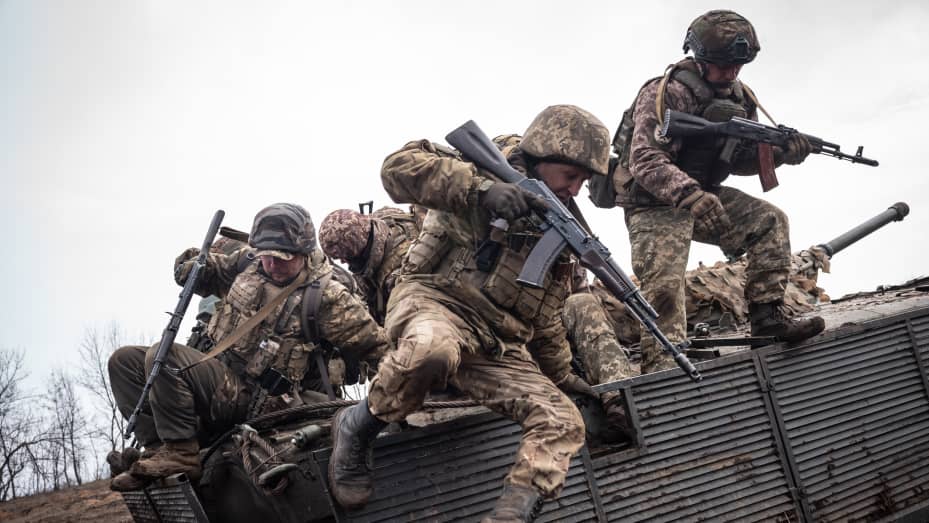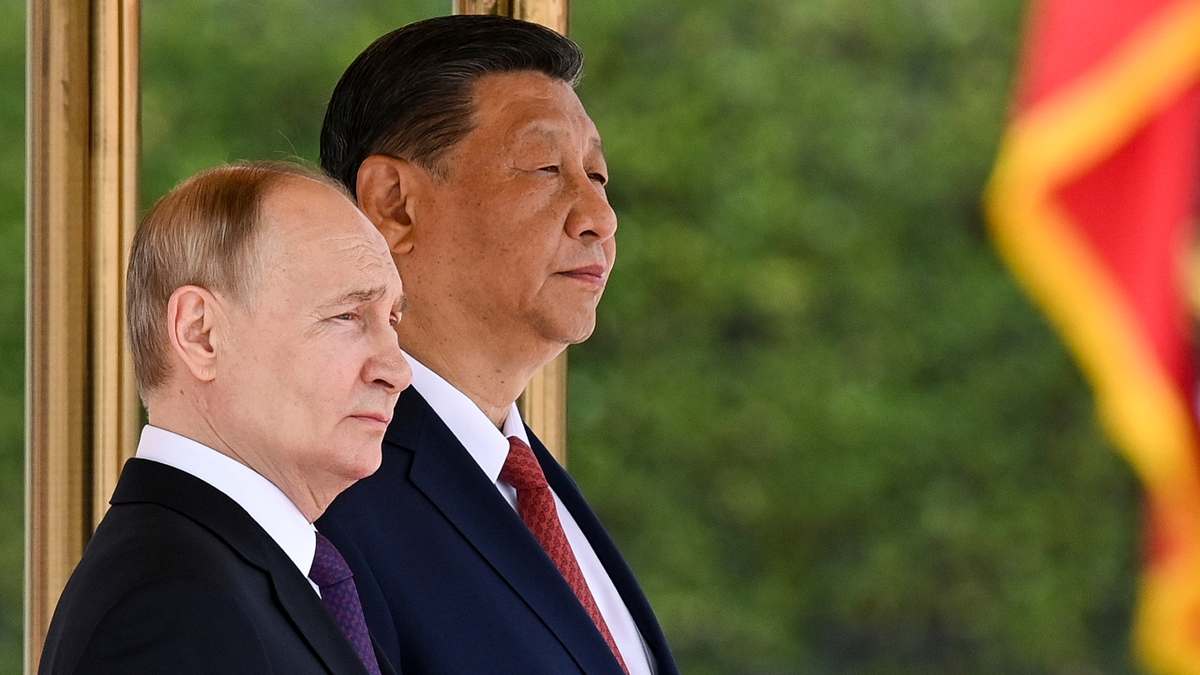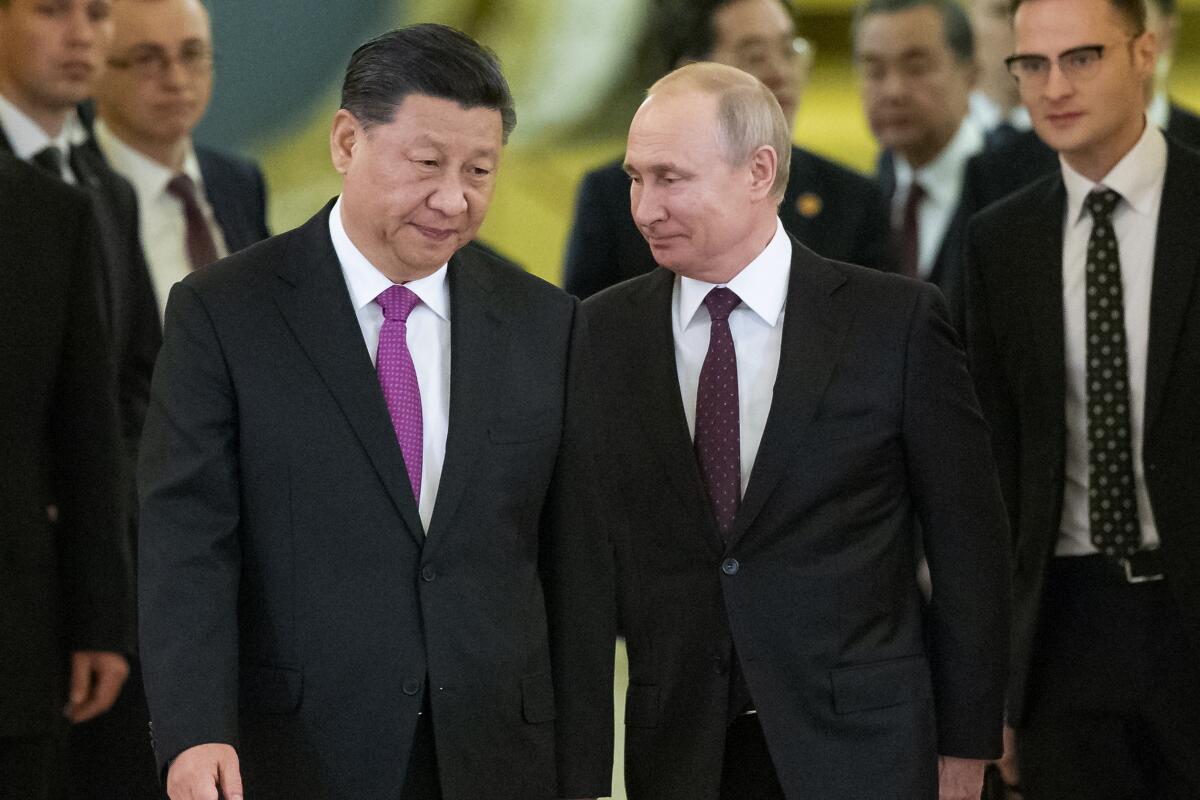More Than Meets The Eye? How Ukraine Wants China’s Intervention In Talks With Russia, Will China Take The Bait?
Ukraine’s foreign minister visited Beijing for the first time during the war, as Kyiv turns to diplomacy to win war aims. China has positioned itself as a potential mediator in the ongoing conflict between Russia and Ukraine. However, its actions and statements have raised questions about its true stance. While China calls for peace talks and respect for sovereignty, it has not condemned Russia's invasion and maintains a close relationship with Moscow. This complex dynamic shows China's vision for a "multipolar" world order, challenging the influence of the United States and Europe.

Ukrainian Foreign Minister Dmytro Kuleba visited Beijing on July 23-24 for important talks with Chinese Foreign Minister Wang Yi.
This was the first time Ukraine asked China to mediate with Russia since Russia invaded Ukraine in February 2022. Kuleba’s visit is part of Ukraine’s efforts to create good conditions for direct talks with Russia.
Kuleba said Ukraine is willing to negotiate “when Russia is ready to talk honestly,” but Russia isn’t showing this willingness. Wang Yi also said the time isn’t right yet.
Russian President Vladimir Putin demands Ukraine give up four regions that Russia partly controls and promise never to join NATO as conditions for a ceasefire and talks.
Over 80 countries supported Ukraine’s call for Russia to respect Ukraine’s sovereignty at a conference in Switzerland last month. Ukraine plans to hold another peace conference this year and is working on issues like food security, energy, and prisoner exchanges at the UN to gain global support before talking with Russia.
President Volodymyr Zelenskyy also plans to meet former US President Donald Trump, who is running for re-election. Zelenskyy said they would discuss ways to achieve a lasting peace. Trump has opposed sending military aid to Ukraine and claimed he could end the war in 24 hours if he became president.
Ukraine’s push for peace is partly because its allies are growing tired.
The US Congress delayed voting on a $60 billion military aid package, and Europe took extra time to approve a 50-billion-euro ($54 billion) military aid agreement due to opposition from Hungary and others.
The situation on the ground is also influencing Ukraine’s efforts for peace.

Ukrainian commander-in-chief Oleksandr Syrskii stated that Russia has 520,000 soldiers on the ground, 50,000 more than last year, and plans to have 690,000 by the end of the year. However, Russian forces have two to three times more equipment than Ukrainian forces.
Ukraine is holding the frontline, with Russia only gaining about 550 square kilometers (193 square miles) this year at a high cost in lives and equipment. However, Ukraine cannot launch a counteroffensive.
President Zelenskyy’s war goals remain the same, but he is now considering negotiations to achieve them, as military victory seems increasingly difficult. He told the BBC that Ukraine might not need to win back all its territory by force, and diplomacy could help.
Kremlin spokesperson Dmitry Peskov welcomed Zelenskyy’s openness to dialogue but said it was unclear what plans were being discussed.
Hungarian Prime Minister Viktor Orban visited Beijing earlier this month for a peace mission that Ukraine and its allies did not approve of. This may have led to tension between Ukraine and Hungary, with Ukraine shutting down the Druzhba pipeline that carries Russian oil to Hungary and Slovakia.
Hungary then froze transfers from the European Defence Fund, affecting countries like Poland, which is waiting for 2 billion euros ($2.17bn) in reimbursements for military donations to Ukraine.
On the battlefield, Zelenskyy told European leaders on July 18 that Ukraine had stopped a new Russian offensive in the Kharkiv region, with satellite images confirming this.
Russia suffered 20,000 casualties there. However, Russian forces made small advances in the eastern and southern fronts, particularly in the Donetsk region. They captured villages near Avdiivka and continued to push westward.
To the north of Soledar and Bakhmut, cities Russia captured last year, Russian forces entered the village of Rozdolivka on Tuesday.
In the Kherson region, Ukraine’s armed forces abandoned a position in the village of Krynky on the left bank of the Dnipro River after Russian shelling destroyed it.
However, Ukrainian units are still operating in nearby areas and from the islands in the Dnipro Delta. Ukraine had occupied Krynky late last year to counter Russian artillery attacks on settlements across the river.

Ukraine’s Attacks Behind Enemy Lines
While Ukraine mostly held its front line last week, it also launched successful attacks deep into Russian and occupied territories.
Ukrainian drones disrupted a Russian coastguard exercise in Lake Donuzlav, Crimea, last week by attacking a naval base. They disabled an ammunition warehouse, an electric substation, and firing positions. Satellite photos confirmed the damage.
Russian officials claimed they stopped two more attacks on Crimea, downing two ATACMS missiles and five drones on Sunday, and another 21 drones on Monday night, most aimed at the port of Sevastopol.
On Saturday, Ukrainian drones attacked Millerovo airfield in western Russia, damaging a fuel tank and causing a fire. Satellite photos showed the drones destroyed both the fuel tank and the maintenance hangar at Millerovo.
On Tuesday, Ukrainian drones heavily damaged the Slavyanin ferry at the port of Kavkaz, which was used to transport railway cars, containers, and vehicles across the Kerch Strait to Crimea. This was the last ferry Russia had at the port.
Ukraine has previously damaged the Kerch bridge and used various means to prevent military supplies from reaching Crimea.
President Zelenskyy urged Western allies to let Ukraine attack Russian airfields used for bombing missions. He said Russia drops about 800 guided glide bombs weekly, causing significant losses.
The US, UK, and Germany have restricted the use of their munitions on Russian soil to avoid a direct NATO-Russia conflict. However, Zelenskyy argued that these fears are unfounded and that lifting restrictions partially in May after Russia attacked Kharkiv helped block further escalation.
President Zelenskyy said, “Military airfields, from which Russian planes take off to bomb our cities, and Russian missile launch sites should be destroyed. The fewer restrictions we have on using effective weapons, the more Russia will strive for peace.”
China as Mediator
China is trying to act as a neutral mediator, but Ukraine and its allies in the US and Europe see China as helping Russia economically to continue the war in Ukraine.
The US and Europe also accuse China of providing tools and electronics used in Russian weapons, though China denies any military support. President Zelenskyy said at the G7 summit in June that Chinese President Xi Jinping promised not to give weapons to Russia.
China insists that any peace talks should consider both Russian and Ukrainian interests. However, Ukraine demands that Russia withdraw from Ukrainian territory for any peace agreement. After more than two years of war, Russia controls about 18-20% of Ukraine.
Engaging with Ukraine helps China avoid appearing too supportive of Russia. While China hasn’t openly supported Russia’s war, its actions suggest indirect support through economic ties and diplomatic moves, according to Petra Aldenrath, head of DW’s Chinese service.
“China aims to increase its influence in Eastern Europe and position itself as a key global mediator,” Aldenrath said. “Beijing’s approach is driven by strategic interests, economic considerations, and a desire to maintain its global diplomatic standing.”

Will China Support a Peace Summit?
During Kuleba’s visit, one key topic will be convincing Chinese officials to attend another peace summit before the US presidential election in November.
China did not attend a peace summit in Switzerland in June, which also excluded Russia.
Before that summit, Chinese Foreign Minister Wang Yi said China had made “constructive suggestions” to Switzerland, according to China’s Xinhua news agency. He added that China would decide independently whether and how to participate in future summits based on its own position.
President Zelenskyy told the Shangri-La Dialogue defense forum in Singapore last month that Russia was trying to use China’s influence on smaller Asian countries to “disrupt” the peace summit. He expressed regret that China was being used by Russian President Vladimir Putin.
Ukrainian officials organized the summit to gather international support for Zelenskyy’s “peace formula” to end the war. A major point of this formula is restoring Ukraine’s territorial integrity, including Crimea, which Russia annexed in 2014.
Before the Switzerland conference, China and Brazil, both BRICS members, proposed a separate six-point peace plan. This plan did not include restoring Ukrainian territory but called for an “international peace conference at a suitable time recognized by both Russia and Ukraine.”
Ahead of his visit, Kuleba said on social media that “we must avoid the competition of peace plans.”
Alexander Gabuev, director of the Carnegie Russia Eurasia Center, stated that Kuleba’s visit might be an attempt to “convince China that it should participate in a second peace summit.”

What is China’s Vision for Peace?
China has never condemned Russia’s invasion of Ukraine.
Two weeks before Russia launched the war in early 2022, Xi Jinping and Vladimir Putin praised the “no limits” cooperation between their countries. Both China and Russia support a “multipolar” world order as an alternative to the dominance of the United States and Europe.
In a 2023 document outlining China’s position on a “political settlement of the Ukraine crisis,” China called for upholding the “sovereignty, independence, and territorial integrity of all countries,” while advocating for peace talks and an end to hostilities.
The document also emphasized “abandoning the Cold War mentality” and stated that “the security of a region should not be achieved by strengthening or expanding military blocs,” referring to NATO expansion, which both China and Russia have blamed as a cause of the war in Ukraine.
After a meeting with Xi in May, Putin blamed Ukraine for rejecting peace negotiations and praised China’s diplomatic efforts.
Moscow also claims to seek “dialogue” to end the war, even as the Russian military continues its ground offensives, bombs Ukrainian cities, and targets civilian infrastructure, including a recent attack on a children’s hospital in Kyiv.





